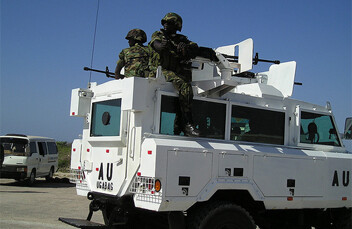As Somalia continues to be ravaged by pirates, it has come to embody the very meaning of state collapse and tragedy. Warships from the United States, Germany, and China are now trying to fight the vicious bandits, who have hijacked 40 vessels in the past year and made off with ransoms totaling more than $30 million.
But this drama is only the latest chapter for a country that has been beset by war, famine, and terrorism ever since the loss of a functioning government in 1991. The international community has spent more than $8 billion trying to fix Somalia during the past two decades, but it remains a stark example of state failure in the postcolonial period.
The United Nations, Western governments, and donors have been trying to fix Somalia in a way that is convenient for them—by creating a central government. They are more willing to accept the appearance of a cohesive regime than they are to accept the reality that they are simply backing one faction, which just happens to control the purported government.
Instead of repeatedly trying to foist a Western style top-down state structure on a deeply decentralized society, the international community should work with Somalia's long-standing traditional institutions to build a bottom-up government.
This would mean working with clans, the single most important component of the population's identity. While Somalis share a common ethnicity, language, and religion, they are divided into four major clans, each with numerous subclans and extended family networks. Like many tribal societies, the clans use customary law to govern their communities—and wield enormous influence.
In Somalia, clans started undermining the country's centralized government as soon as the country achieved independence in 1960, ultimately driving Siyad Barre's regime to its dismal end in 1991. The country has been fragmented into autonomous fiefdoms ever since.
Now, the country has become a haven for Islamic insurgents and could potentially destabilize the Horn of Africa and beyond. With violence on the rise, it is a growing humanitarian disaster.
Just as clans helped destroy Somalia's government, they can be instrumental in reconstituting it. Already they have created a semblance of order in many parts of the country, using their traditional governing system to resolve disputes and encourage some investment. Somaliland, the self-declared independent state in Somalia's northeast, has even held a number of free elections, and established enough stability and prosperity to attract migrants from around the region.
The international community could help rescue Somalia by working directly with these clans, incorporating their informal governing methods into regional and local governments. Foreign aid could help construct these bodies, and find ways to formalize dispute resolution between groups.
A chain of such governments would provide for almost all the population's day-to-day needs. This new state structure would be designed to correspond as closely as possible to the underlying clan structures, with almost all money and responsibility decentralized to the lower levels.
The central government would manage a common currency (through a technocratic central bank), offer a venue and process for negotiating clan disagreements, and provide a platform for clan representatives to work on a few foreign policy and national infrastructure issues. As state institutions mature over time and the working relationships among clans improve, more regulatory powers could be established at the center.
However, the great majority of international assistance should be directed at the local level, where the chances of bringing peace, stable administration, and the benefits of development are likely to be greatest. Such assistance could be conditioned on each regional government's commitment to manage foreign aid transparently, as well as its readiness to expel terrorists, pirates, and organized criminals.
This confederate structure would somewhat mirror the way some European countries, such as Switzerland, functioned before the rise of centralized states. The national government would have even less power than the pre-Civil War American federal government had.
Within Somalia, the biggest obstacle to this approach, aside from the growing chaos, would be the weakening of traditional clan structures in parts of the south. But a program of autonomous self-government could be readily implemented in a few regions right away—such as Somaliland, Puntland, and Galmudug—and as outside assistance helped these areas improve their public services and economies, other regions would seek to join them. Offering to empower subclans or independent factions in this way would give local leaders—including warlords and moderate Islamists in some places—an incentive to participate in government.
But the far greater challenge is to get the international community united behind an approach that breaks from its one-size-fits-all state-building formula. Somalis have suffered enough. It is time for a strategy that better fits the country's social fabric.
Seth Kaplan is a foreign policy analyst and a business consultant to companies in developing countries. His book Fixing Fragile States: A New Paradigm for Development (2008), critiques Western policies in places such as Pakistan, Somalia, West Africa, and Bolivia, and lays out a new approach to overcoming the problems they face. He visited Somalia when writing the book. For more information, see www.sethkaplan.org.




